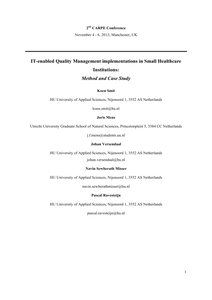THE PDCA-CYCLE MIGHT NOT BE APPLICABLE in situations where change is unplanned or emergent. In situations of planned change the Deming cycle is used worldwide and proven to be very effective. However in an emergent change process the PDCA might not be the applicable. These emergent changes increase. In those cases, like Lao Tzu said: ‘A good traveller has no fixed plans, and is not intent on arriving’. Studying cultures that have another view on planning might help to find a new approach that fits in times of emergent change. Experiences in Africa lead to a new model for change called ACCRA (c). It also has reflection-in-action as its core. But it requires attention to people, considering the context and showing commitment as well along the whole process. This article describes the design and first experiences with a new approach for improvement in emergent change processes.
MULTIFILE

In the dynamic environment of increasing regulations, increasing patient demand, decentralization of budgets and enforcement of efficiency, small sized healthcare institutions in the Netherlands are having a difficult time. Although these service providers are usually capable of flexibly delivering healthcare, the investment and overhead for implementing and executing on required quality management standards like ISO 9001 is difficult. In this paper we construct a method for the implementation of an IT-enabled quality management system for small sized healthcare institutions, which is applied through case study. The case organisation provides intra- and extramural care for mentally handicapped persons and young adults with a psychiatric disorder. The quality management system implementation is based on 1) a lightweight IT infrastructure (based at a secure data centre and accessible through remote login) implying secure storage of patients' medical and personal information. Furthermore, the Deming (Deming, 1982) cycle enabled processes and protocols are 2) described in an e-handbook and prototyped via an open source process management system which supports the quality regulation demanded for providing care to patients. The case study supports the validity of our method and the fact that small sized healthcare institutions are able to execute their care while adhering to ISO 9001-like standards, with limited initial costs and relatively low cost of ownership
DOCUMENT

De PDCA- of Demingcyclus is het hart van de kwaliteitskunde en heeft haar nut bewezen. Het is echter geen panacee, datin alle culturen en op alle tijden even bruikbaar is. Met nanme in andere dan westerse culturen in tijden van snelle veranderingen voldoet Plan-Do-Check-Act niet.
DOCUMENT
